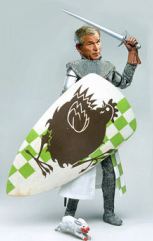I’ll Stay with the Circus, Thanks
 Tuesday, February 28, 2006 at 01:53PM
Tuesday, February 28, 2006 at 01:53PM  Quote: “It’s a known fact y’all tired of the circus/ so come home where you smell the crack in the verses.” Rap group Clipse in their song “Reup Intro,” quoted in Slate’s “Music Box” column.
Quote: “It’s a known fact y’all tired of the circus/ so come home where you smell the crack in the verses.” Rap group Clipse in their song “Reup Intro,” quoted in Slate’s “Music Box” column.
Figure of Speech: enthymeme (EN thih meem), the argument packet.
Clipse isn’t like those phony rappers who never earned their street creds. The two men in this group claim superior authenticity through their careers as cocaine dealers.
They state their case through a classic enthymeme, Aristotle’s rhetorical version of his logical syllogism. The enthymeme (“something in the mind”) takes the audience’s value or belief as a jumping-off point for an argument. It goes like this: belief, therefore conclusion. It’s the centerpiece of Aristotelian Logos, the rational part of argument.
Figaro thinks these gentlemen make better logicians than rhymesters.
Snappy Answer: “Is that a song or an advertising jingle?”






